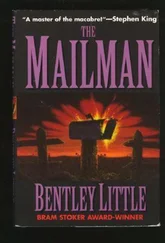Again, he felt like a traitor to his principles. But even that feeling faded as the days passed, and it was not long before going to The Store was like going to Buy-and-Save or going to Siddons Lumber, something he did easily and naturally, without thinking.
That troubled him when he thought about it.
But he seemed to think about it less and less, and when Ginny said to him one night that Sam wanted to apply for a part-time job at The Store, he did not say that she couldn't.
"You know," Ginny said, "she needs to save up some money for college. Even if she gets a scholarship, she'll still need money. And she wants to buy a car, too. She mentioned something about going with you to the auction in Holbrook."
Ginny had hinted around several times before that Sam wanted to work at The Store, and he'd thought of those people outside The Store's recruiting office, thought of all the weirdness that had been buzzing around the place since it had begun building in Juniper, and he'd automatically vetoed the idea.
But it was hard now to maintain that sense of ominousness. What could happen to his daughter? Especially if she only worked part-time. Other people would always be around, both employees and customers, and it was virtually impossible for him to imagine all of them affected by some bizarre supernatural occurrence.
Supernatural?
Even the thought of it seemed ludicrous.
"The Store lets part-timers work flexible hours," Ginny added. "And they pay better than George's or KFC or any of the other places kids in town usually work."
He looked over at her. "We'll see," he said. "We'll see."
2
The Store was the talk of the school.
Ginny could not remember when one topic had so dominated all conversations. Local, state, and national elections, wars, international incidents -- nothing had captured the interest of faculty, staff, and students the way The Store had.
It was a sad state of affairs when the opening of a discount retail outlet had more of an effect on people's lives than important world events.
Still, she found herself right in there with the rest of them, talking about the astonishingly new fashions and the amazingly low prices and the vast array of household products now available in town.
"I'm already in debt," Tracie Welles said at lunch one day when they were talking about how much they'd spent at The Store. "I'm maxed out on my MasterCard, and I had to put a couple of things on layaway."
For a brief second, Ginny thought of those black trucks traveling at night, thought about large segments of Juniper's population going into debt to The Store, and a quick chill passed through her.
Then it was gone, and she was laughing with the rest of the teachers in the lounge as they speculated about what their spouses would say when the credit card bills started rolling in.
What really surprised her was Bill's complete reversal on The Store. For months he'd been almost pathologically hostile toward anything even remotely connected to the business. Now, suddenly, all that negativism had disappeared.
It was as if he'd been instantly converted. He'd gone to the grand opening, had seen that there was nothing strange or out of the ordinary, nothing evil or unusual, and all of his reservations had vanished. He went there, he shopped there, sometimes he even just browsed there.
And last night he'd pretty much agreed to let Sam work there.
Miracles never ceased.
After work, Ginny drove past the high school on her way home. It was a bad habit, she knew. And, as her friends told her, she should probably trust her daughters a little more. But she worked at a school; she knew what kids these days were like.
Besides, even good girls did bad things.
That's how Samantha had been conceived.
Ginny didn't regret it. She loved her daughter. But the fact remained that her life would probably have turned out far differently had she not gotten pregnant so young. She would have finished earning her master's degree, for one thing. Might even have gone for a Ph.D. But the responsibilities of motherhood had been thrust upon her, and almost before she knew what had happened, she'd dropped out of college, she and Bill had gotten married, and her plans for the future had been radically redesigned.
She wanted better for her daughters. She wanted them both to finish their educations, to find themselves before they were forced to take on the roles that they would play for the rest of their lives. She did not want them to go straight from being a daughter to being a mother. They needed time to be adults themselves, to forge their own identities apart from parents or mates or children.
So, yes, perhaps she did keep too tight a rein on them sometimes. She didn't let them run around totally unsupervised. She checked up on them to make sure they were where they said they'd be. She and Bill both enforced strict curfew hours. Bizarre behavior by Juniper's redneck standards. But hopefully their daughters wouldn't end up like most of the other girls in town.
She stopped off at the farmer's market for vegetables, then picked up bread and milk at the Buy-and-Save before heading home. Bill was gone -- at Street's, according to a note attached to the refrigerator -- and she had the house to herself. For once.
Shannon arrived a half hour later while Ginny was chopping tomatoes for pasta sauce. She tossed schoolbooks on the table next to the door, plopped down on the couch, and immediately used the remote control to turn on the television.
"Silence is golden," Ginny said.
"Silence is boring," Shannon replied. "I hate coming home to a quiet house. It's creepy."
"I think it's nice," Ginny said, but her daughter was already flipping channels, trying to find the talk show with the most outrageous topic.
Samantha walked in a few minutes later. She smiled, said hello, went into her bedroom to drop off her books, then came back into the kitchen and got a can of Dr. Pepper out of the refrigerator. She sat down in the breakfast nook, across from where Ginny was chopping.
She sighed loudly, melodramatically.
Ginny tried not to smile, continued chopping.
"I need money," Samantha said.
"You could try getting a job."
"That's what I'm talking about." She leaned forward. "The Store's still hiring, but I don't know for how much longer. Those jobs are going fast. They need people to fill those positions."
"Then why don't you get an application?"
"Can I?"
"It's fine with me."
"I know it's fine with you. But what about Dad?"
Ginny stopped chopping, smiled. "Ask your father," she said. "I think it'll be okay."
"You talked to him?"
"What are mothers for?"
"Oh, thank you, Mom!" Samantha leaped up, ran around the counter, threw her arms about her mother and hugged.
"Puke," Shannon said from the couch. "I think I'm gonna barf."
Ginny laughed. "You could learn a little bit about the art of gratitude from your sister."
"Yeah, right."
Samantha remained in the kitchen, talking excitedly about how she'd juggle school and work, while Ginny finished making the sauce and then started to boil the pasta. She stopped talking when Bill came home, lapsing immediately into a nervous, expectant silence, and Shannon giggled at her from the living room.
Ginny silenced her younger daughter with a quick glance.
"Hi, Dad," Samantha said, moving out of the kitchen to greet him.
Bill frowned suspiciously, an expression that was only half put on. He looked from Samantha to Shannon to Ginny. "All right, what's going on? Who wrecked the car? Who broke my computer? Who had the nine-hundred-dollar phone bill?"
"Oh, Dad," Samantha said. "Can't I even say hello to you without you going overboard and reading something into it?"
Читать дальше












